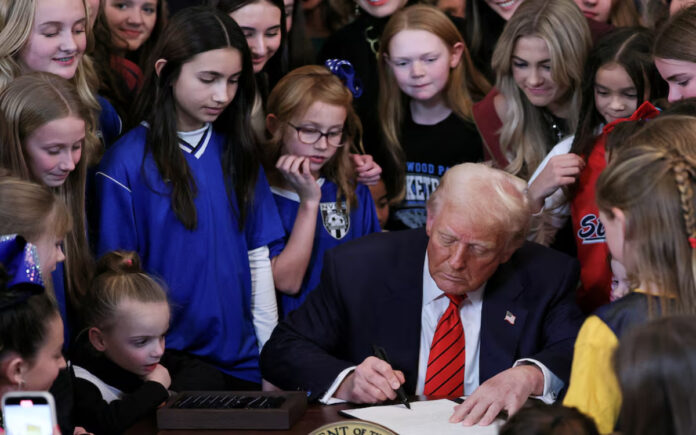Washington: U.S. President Donald Trump signed an executive order on Wednesday aimed at barring transgender girls and women from participating in female sports competitions. Supporters argue the move will restore fairness in women’s sports, while critics say it infringes on the rights of a small minority of athletes.
The order directs the Department of Justice to ensure that all government agencies enforce a ban on transgender girls and women competing in female school sports, based on Trump’s interpretation of Title IX, the federal law prohibiting sex-based discrimination in education.
“The war on women’s sports is over,” Trump declared during the signing ceremony, where he was flanked by about 100 women and girls, many dressed in sports uniforms and jerseys. “My administration will not stand by and watch men beat and batter female athletes.”
The executive order, which is expected to face legal challenges, threatens to withhold federal funding from any school that allows transgender women or girls to compete in female-designated sporting events.
The directive would impact a relatively small number of athletes. The president of the National Collegiate Athletics Association (NCAA) testified before a Senate panel in December that fewer than 10 transgender athletes were competing among the 530,000 students participating in sports at 1,100 NCAA-member schools.
The NCAA welcomed the executive order, saying it provides a “clear national standard in the face of a patchwork of conflicting state laws and court decisions.” The organization stated it would align its policies accordingly.
“The NCAA Board of Governors is reviewing the executive order and will take necessary steps to align NCAA policy in the coming days, subject to further guidance from the administration,” the statement read.
Under current NCAA regulations, transgender women athletes must meet sport-specific testosterone limits to compete in female categories.
Legal Challenges and Public Opinion
The issue has resonated with voters, as Trump’s campaign rallies frequently featured applause when he mentioned bans on transgender athletes. His campaign also aired advertisements criticizing policies that allow transgender women and girls to compete in female sports.
Polling indicates that a majority of Americans oppose transgender athletes competing in sports aligned with their gender identity. Twenty-five Republican-led states have already enacted laws banning transgender girls from participating in girls’ sports.
Federal courts, however, have generally ruled in favor of transgender athletes. The 9th U.S. Circuit Court of Appeals blocked Idaho’s ban, while similar bans in West Virginia and Arizona have been halted for specific plaintiffs. A federal district judge in New Hampshire also issued an injunction against the state’s enforcement of its ban for two plaintiffs.
Meanwhile, the Biden administration’s 2024 interpretation of Title IX, which sought to protect transgender individuals from sex-based discrimination, was blocked by a federal judge in Kentucky in January.
Expanding Restrictions on Transgender Rights
The executive order is part of a broader set of Trump administration policies targeting transgender rights. Other recent orders include one aimed at halting all federal support for gender-transition healthcare for individuals under 19 and another banning transgender people from serving in the military—both of which have already faced legal challenges.
On his first day back in office on January 20, Trump signed an order mandating that government employees refer to “sex” rather than “gender” in official documents. The order also defines sex as an “immutable biological reality” that does not accommodate gender identity changes.
Also Read | Inaugural Director of U.S. AI Safety Institute Steps Down Amid Uncertainty
Trump’s latest directive extends beyond school and collegiate sports, calling for the U.S. government to deny visas to transgender women seeking to compete in sports within the United States. It also instructs the State Department to pressure the International Olympic Committee (IOC) to revise its policy, which currently allows transgender athletes to compete under guidelines aimed at ensuring fairness.
A White House official stated that the U.S. government will use “all of our authority and our ability” to enforce the order in Olympic events hosted on American soil. The 2028 Summer Olympics in Los Angeles could be directly impacted by the policy.
Reactions from Advocacy Groups and Lawmakers
Chris Erchull, a senior staff attorney at the pro-LGBTQ legal group GLAD Law, argued that interscholastic athletics associations and coaches have long ensured fairness in sports and that banning transgender athletes does not enhance competitiveness or safety.
“We’re talking about a minuscule number of students. What’s more, we’re talking about students who aren’t posing any threat to other girls in school sports, and yet there is this enormous effort to take away their rights,” Erchull said. “It’s an absurd way to approach those goals.”
Also Read | U.S. Government Vessels Granted Free Passage Through Panama Canal
Human rights group Amnesty International condemned the ban, calling it an attempt to “stigmatize and discriminate against LGBTQ+ people.”
Meanwhile, Republican lawmakers in Congress praised the move. U.S. Representative Tim Walberg criticized the Biden administration for attempting to “unravel decades of progress made by women to appease the most radical fringes of its own base.”
The executive order is expected to face numerous legal challenges as advocacy groups, athletes, and legal experts prepare to contest its enforcement.



